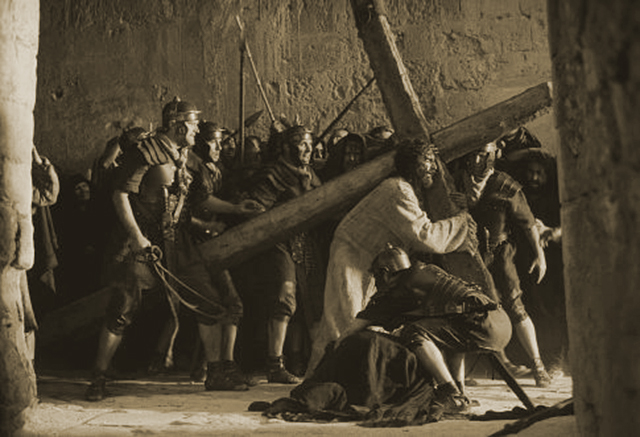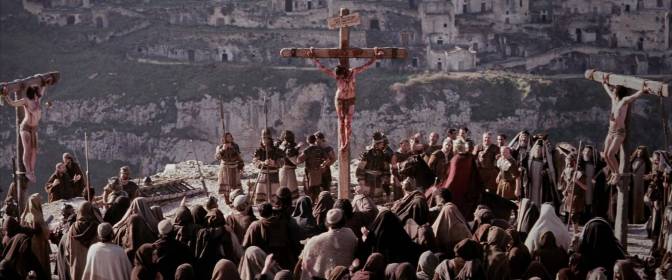In this worst of acts, the best of all possible things was done for us

Good Friday
A jar full of sour wine was standing there; so they put a sponge full of the sour wine upon a branch of hyssop and brought it up to His mouth. Therefore when Jesus had received the sour wine, He said, “It is finished!” And He bowed His head and gave up His spirit.
John 19:29-30
Holy Week Prayer: O Jesus, Who by reason of Thy burning love for us hast willed to be crucified and to shed Thy Most Precious Blood for the redemption and salvation of our souls, look down upon us here gathered together in remembrance of Thy most sorrowful Passion and Death, fully trusting in Thy mercy; cleanse us from sin by Thy grace, sanctify our toil, give unto us and unto all those who are dear to us our daily bread, sweeten our sufferings, bless our families, and to the nations so sorely afflicted, grant Thy peace, which is the only true peace, so that by obeying Thy commandments we may come at last to the glory of heaven. Amen. Ora Pro Nobis.
The best things in the world that are at their worst
G. K. Chesterton, The Everlasting Man
The very worst way to die
It was an excruciating death. The very worst way to die – which is why the Romans chose it as a deterrent especially for what they considered political crimes against the State. Listen as Jordan Peterson explains this and observes what the story of the Crucifixion means to him.
Why is it ‘Good Friday’?
Today at the 6 hour, which in our time is noon, we begin a vigil in memory of what was done for the whole world on that day so long ago on that Friday at Calvary. We call it Good Friday because in this worst of acts, the best of all possible things was done for all of us.
For God so loved the world that He gave His one and only Son, that everyone who believes in Him shall not perish but have eternal life.
John 3:16

The best argument for Christianity
In 1925, G.K. Chesterton wrote what writer Ross Douthat described as “as the best modern argument for Christianity I’ve ever read” And in that argument, Chesterton doesn’t end with a conclusion on his Good Friday observation from The Everlasting Man, he starts with one – the only conclusion a sane man can make about this world and about ourselves and why the Christ did what he did: we cannot save ourselves.
We cannot save ourselves. Not by our education, not by our medicine, not by our armed forces, not by our art and music, not by our philosophies, not by our politics nor our governments. None of these things, even at their best, have been able to do the one thing that would change the world – change a man’s spirit. A man can have a change of mind and heart, a metanoia, but he needs a Savior to change his spirit. Otherwise, the other conclusion is an inevitable and very dark one. The Cross was and is the only way out of this dilemma.
“All the great groups that stood about the Cross represent in one way or another the great historical truth of the time; that the world could not save itself. Man could do no more. Rome and Jerusalem and Athens and everything else were going down like a sea turned into a slow cataract. Externally indeed the ancient world was still at its strongest; it is always at that moment that the inmost weakness begins. But in order to understand that weakness we must repeat what has been said more than once; that it was not the weakness of a thing originally weak. It was emphatically the strength of the world that was turned to weakness and the wisdom of the world that was turned to folly.
In this story of Good Friday it is the best things in the world that are at their worst. That is what really shows us the world at its worst. It was, for instance, the priests of a true monotheism and the soldiers of an international civilisation. Rome, the legend, founded upon fallen Troy and triumphant over fallen Carthage, had stood for a heroism which was the nearest that any pagan ever came to chivalry. Rome had defended the household gods and the human decencies against the ogres of Africa and the hermaphrodite monstrosities of Greece. But in the lightning flash of this incident, we see great Rome, the imperial republic, going downward under her Lucretian doom. Scepticism has eaten away even the confident sanity of the conquerors of the world. He who is enthroned to say what is justice can only ask:
‘What is truth?’
So in that drama which decided the whole fate of antiquity, one of the central figures is fixed in what seems the reverse of his true role. Rome was almost another name for responsibility. Yet he stands for ever as a sort of rocking statue of the irresponsible. Man could do no more. Even the practical had become the impracticable. Standing between the pillars of his own judgement-seat, a Roman had washed his hands of the world.” ― G.K. Chesterton, The Everlasting Man, 1925
How to celebrate Good Friday at home.


